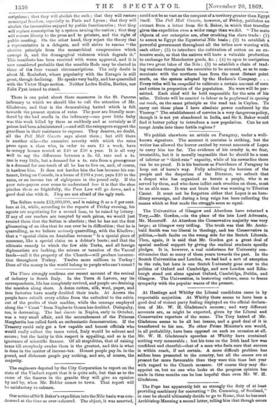could not be so vast as the conquest of a
territory greater than Egypt iteelf. The Pall Mall Gazette, however, of Friday, publishes an extract from a letter from Sir S. Baker, in whibh that traveller gives the expedition even a wider range than we did. "The main objects of our enterprise are, after crushiag the slave trade : (1) to annex to Egypt the Equatorial Nile basin ; (2) to establish a powerful government throughout all the tribes now warring with each other ; (3) to introduce the cultivation of cotton on an ex- tensive wale, so that the natives will have a valuable production to exchange for Manchester goods, &c. ; (4) to open to navigation the two great lakes of the Nile ; (5) to establish a chain of trad- ing stations throughout the countries to be annexed, so as to com- municate with the northern base from the most distant point south, on the system adopted by the Hudson.'s Company. . . . Every tribe will, be compelled to cultivate a certain amount of corn and cotton in proportion of the population. No wars will be per- mitted. Each chief will be held responsible for the acts of his tribe. Tribute will be exacted in labour to be performed in opening out roads, on the same principle as the road tax in Ceylon. To carry out these plans I have absolute power conferred by the Viceroy." The establishment of cornies is a very dangerous policy, though it is not yet abandoned in India, and Sir S. Baker would find it better policy to introduce a new population. Can he not tempt Arabs into those fertile regions ?


































 Previous page
Previous page